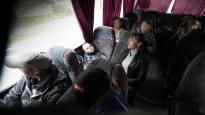Volunteers rescued people from Lysitshansk in eastern Ukraine who had been in the middle of the war for more than two months. got on the evacuation bus.
3.5. 14:10 • Updated 3.5. 14:11
LYSITCHANSK A number of people are facing it. Everyone wants to be picked up by the bus immediately.
Lysitshansk in the eastern Donbass in eastern Ukraine is the easternmost region controlled by the Ukrainian army.
Almost since the beginning of the war, Russia has also tried to take over Severodonetsk on the other side of the river.
Ukraine’s defense has still held up.
Those gathered in front of the Lysitshansk fire station, on the other hand, want to leave. They’ve been in the middle of a war for two months now, and the risks are growing all the time.
– Our house has no windows and we want to survive, he says Galina.
Firefighters carry Galina to the evacuation bus of a mother over the age of eighty. The bus is organized by the Andrei Punchuk Foundation.
Many who live in front-line villages and small towns are in too poor a state to flee on their own.
– It was terrible in the middle of the war. Like a horror movie. We were scared night and day.
The 86-year-old mother is lying in Galina’s lap in the backseat.
– I’m fine, but my legs don’t work, Mom says suddenly.
“We always stayed for another day”
The evacuation bus has come a six-hour journey from the large city of Dnipro. About forty refugees can get to the Dnipro reception center by volunteer bus.
Some refugees say they have relatives across Ukraine to which they are traveling. Others have no idea what to do next.
Many of the refugees have fled Rubižné. It is located north of Severodonetsk and is the front line of war.
– We’re from Rubižné. Yesterday a shot hit our house directly. The house burned down in half an hour. We were in the yard in work clothes. We turned on without papers or anything else, he says Jelena.
Jelena’s husband has a big wound on his head. The shard hit it in the evening, but as if by a miracle trade, he survived with minor injuries.
Jelena’s mother, over eighty years old, is sitting across from her.
– The dog burned inside the house, the cats, everyone … The cows next door came out of the shed. It didn’t burn in the shock, Jelena says and bursts into tears.
Many old people have persevered in front-line villages during the war.
Even Jelena wonders about it for herself.
– Every night we talked that maybe, maybe our house won’t hit and we always stayed for another day. Eventually, our house was destroyed too, Jelena says, almost in a whisper.
“I want to put my grandchild in first grade”
For safety reasons, the evacuation bus stops in Lysitshansk in just ten minutes. From afar comes the roar of war.
Behind the evacuation bus is a destroyed bus in memory of the Russian fire.
The fugitives from Rubižne are shocked to the eye.
Anatoly one still cannot understand what has happened to his hometown.
– Already in the beginning of March, the dead had been buried in the stadium. There are many dead, they are buried next to the stairwells.
Anatoly cannot hold back its tears. He says he still wants to live a little longer, so he left.
– I want to take my grandchild to first grade. That’s how much I want to live.
– He who sits in Moscow. I don’t want to talk about him at all because there are no beautiful words about him. A curse word suitable for him has not even been invented. I can’t find in my head why he could be called.
“You would even be sorry”
There is no sympathy for Russia or its president on the bus.
From the adjacent row of benches Irina wants to have their say. He has lived all his life in Severodonetsk.
– What all that bastard Putin has done. Didn’t he even pity his own people. After all, a lot of Russian soldiers are dying here. If he didn’t feel sorry for us, he would even feel sorry for himself, says Irina.
There are also a few families with children on the bus, some with very small children.
Anastasia escapes with her teenage son.
– We were bombed. The house is without windows. We lived without water, electricity or gas. We want to take the boy out to safety, he says.
Stas Bosenko is voluntarily involved in the evacuation operation. Before the war he was a teacher, now the schools are closed.
– I want to help people who do not have the opportunity to get out of dangerous places. I have a duty to protect my loved ones, but also all Ukrainians.
Bosenko is almost daily involved in evacuating people. Sometimes there are two buses on the trip, today one.
– There are people, especially the elderly, who do not want to leave their homes. I hope you get the message out that they have to leave. Their residence at the forefront of the war is life-threatening, Bosenko notes.
